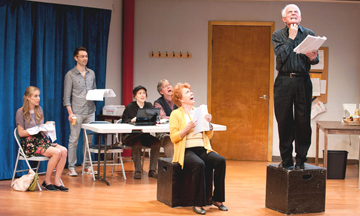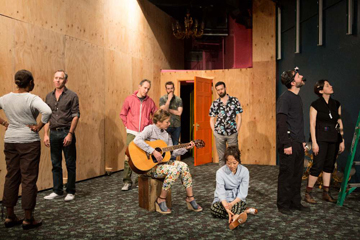Theatre: What I Learned Doing Theatre
By Wendy Caster
ART TIMES November 2015 online
 In Tom Dudzick’s comedy Don’t Talk to the Actors, a young playwright has his first Broadway production. (Penguin Rep Theater production: Alexandra Turshen, David Arkema, Claire Karpen, Wilbur Henry, Beth Fowler, and Richard Kline. Photo by Aaron Pepis.) |
I’m always astonished and horrified when a theatre critic—or any arts reviewer—unloads a barrage of ridicule at an artist or show (or book or movie). Yes, sometimes a show is bad, even terrible, and it’s the role of the reviewer to discuss its problems and weaknesses. But why are some writers so happy to pile on the sarcasm and sheer meanness?
I suspect that one of the reasons is that they haven’t created any art themselves. They haven’t acted or written a play. They’ve never revealed their own vulnerable underbellies. For if they had, wouldn’t they show a little more compassion?
My own experience in the theatre has been varied. Early on, I was an electrician and stage manager, in college and, for a short time, professionally. (Just barely professionally; I only survived because I had a highly illegal sublet with fabulously low rent.) Later I was an usher at the Public Theatre in New York, which allowed me to see shows develop from the first preview to the last performance. More recently, two of my short plays were done in an Off-Off-Broadway theatre. One was a thrilling experience, the other a nightmare. I also once performed in a show that I co-wrote, though it was more of a reading than a performance. Last, through a book I wrote, I have experienced being reviewed, both positively and negatively (scathingly, actually).
Here are some of the things I saw when I did theatre: People working their butts off with a sincere desire to make worthwhile art. Directors dealing with insufficient money and time. Actors learning a completely new score for a musical during the day while still singing the old one at night. Playwrights tearing out their hair because the director didn’t understand the play. A dancer who walked everywhere to save on carfare, because money was so tight.
I worked on a show where people backstage were painting the scenery for Act 3 while Act 1 had already started. It was a nerve-wracking night, but ultimately a success.
I saw actors grabbing catnaps between their day jobs and evening rehearsals.
I worked on a show where the owner of the theatre periodically decided not to let us in.
I worked on a show where we missed a rehearsal due to a bomb scare.
I saw stage managers keep everything running like clockwork without seeming to sleep, eat, or even go to the bathroom.
 Anne Washburn’s play 10 Out of 12 presents a tech rehearsal, complete with head sets for audience members. (Soho Rep production: Quincy Tyler Bernstine (back to audience), Bruce McKenzie, Gibson Frazier, Nina Hellman, Conrad Schott, David Ross, Sue Jean Kim, Garrett Neergaard and Leigh Wade. Photo by Julieta Cervantes.) |
I saw moments of great beauty as well as moments of deep ugliness. I felt how much it can hurt to compromise.
What did I learn from all of this? I learned that performers are genuinely brave. I learned that, like the most astonishing magic tricks, theatre is the result of a truly phenomenal amount of work.
I understand that what I am writing is not news, but it all has a different reality when you’ve seen it personally, when you’ve sat through the tedium of tech rehearsals, experienced the incredible disappointment of having more people on stage than in the audience, and generally lived through the moment-by-moment reality of making theatre.
Some reviewers and critics don’t seem to realize—or care about—the damage they do when they attack real people who have hearts and feelings and who have genuinely tried their best. I feel like saying to those critics, “What the hell have you ever done?”
The bottom line is that the people who make art happen are the ones who take the risks. They stick their necks out. They reveal their weaknesses. They stand before us, whether physically or figuratively, and they share themselves. They are the ones doing it.
I’m not saying that people who haven’t done theatre can’t write thoughtful, useful, and insightful theatre-related articles or reviews. Being in the audience is a part of theatre too—an incredibly important part. No audience, no theatre. Also, writers who have seen hundreds of plays have had hundreds of opportunities to learn about writing, acting, directing, and design. But experiencing the machinery behind the magic provides a visceral sense of what it takes to put on a show.
I’m also not saying that critics should never be critical. But even bad shows and lousy performances deserve thoughtful reviews and compassion. I't can take just as much work to produce a bad piece of art as a good one, and the creators deserve respect for their commitment and heart.
And that’s what I learned doing theatre.
Wendy Caster is an award-winning writer living in New York City. Her reviews appear regularly on the blog Show Showdown. Her short plays You Look Just Like Him and The Morning After were performed as part of Estrogenius festivals. Her published works include short stories, essays, and one book. )
